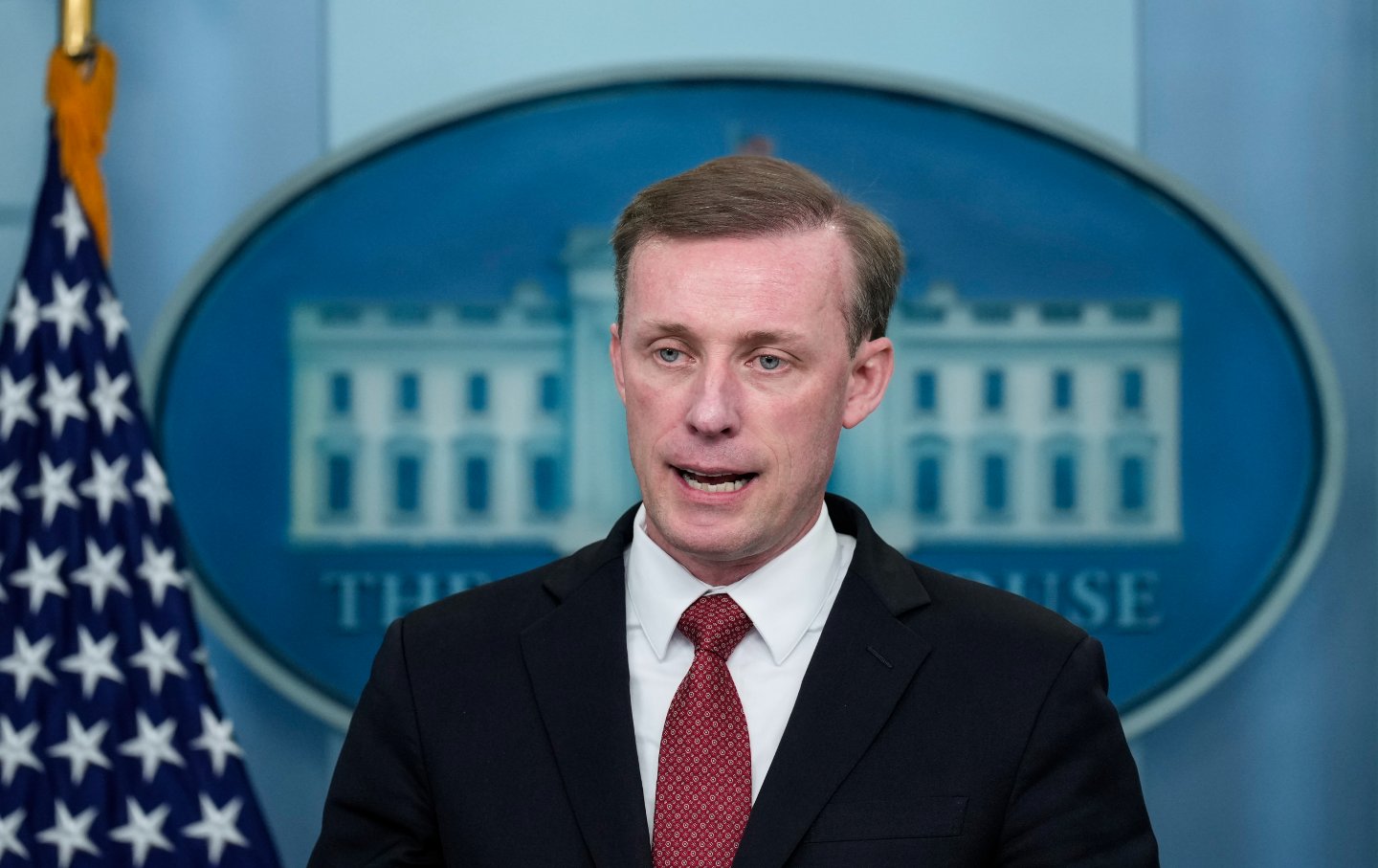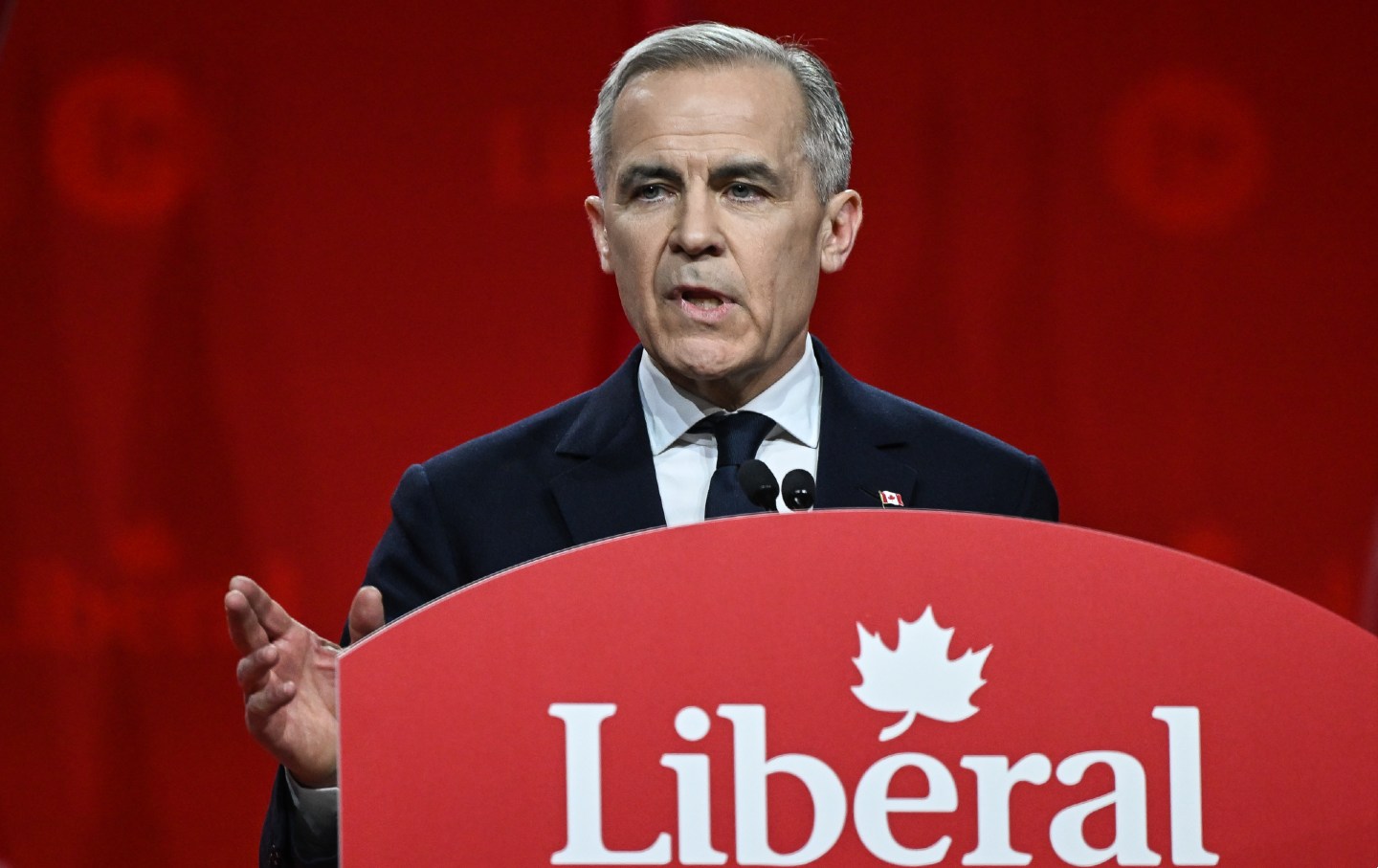Jake Sullivan’s Rewrite Can’t Paper Over an Impoverished Foreign Policy
The national security adviser’s hasty edits make clear the incoherence of Biden’s diplomacy.

When the shapers of American foreign policy want to demonstrate their intellectual seriousness, they invariably show up in the pages of Foreign Affairs, a venerable journal now 101 years old [Editor’s Note: which makes it only a half century younger than The Nation]. In 1947, George Kennan, adopting the moniker of “X,” published in Foreign Affairs his anti-communist manifesto “The Sources of Soviet Conduct,” which, for better or worse, served as the theoretical foundation for the policy of containment that governed American global strategy till the end of the Cold War in 1991. National security adviser Jake Sullivan was deliberately alluding to Kennan’s seminal essay in his own recent essay “The Sources of American Power,” which ran in the October 2023 issue of Foreign Affairs.
The title betrayed Sullivan’s ambition to provide nothing less than a manifesto for Joe Biden’s foreign policy—a statement of principle that would ring through not just the president’s term in office but future decades. Like Kennan, Sullivan doesn’t suffer from excessive modesty of purpose: The essay argued that Biden’s foreign policy of strategic competition with great-power rivals like China and Russia was as significant a turning point in American history as the start of the Cold War in the 1940s and the rise of American unipolar power in the 1990s.
But while Kennan’s 1947 call to arms won support among incipient Cold Warriors because it seemed to be vindicated by the hardening of Soviet control over Eastern Europe in the late 1940s, Sullivan’s credo was almost immediately overtaken by events that cruelly revealed the limits of his analysis. Sullivan’s article was sent to press on October 2. Just five days later, Hamas launched a ferocious and unprecedented attack that took more than 1,200 lives, leading in turn to the ongoing Israeli attack on Gaza that has already killed thousands.
Sullivan’s essay now exists in two forms: the print version, which can be found as a PDF here, and an online version available here. The online version carries this editor’s note: “Before this article was posted online, a passage in it about the Middle East was updated to address Hamas’s attack on Israel, which occurred after the print version of the article went to press.”
In truth, the article was more than just “updated.” It was substantially changed in ways that illustrate both the incoherence and bankruptcy of Biden’s foreign policy.
In the original print version, Sullivan boasted that the “disciplined” approach of the Biden administration to de-escalation and negotiation in the Middle East had borne fruit. According to Sullivan in the print version, “Although the Middle East remains beset with perennial challenges, the region is quieter than it has been for decades.”
This embarrassing line was excised from the online version. Some right-wingers have pounced on the revisions as proving that the Biden administration was a victim of overconfidence and naïveté. The Trump campaign denounced Sullivan as “Biden’s Delusional National Security Advisor.”
What right-wing critics fail to realize is that Sullivan’s delusions come from the bipartisan ideas that unite Biden with Trump. Underlying Sullivan’s article was advocacy for the Abraham Accords approach to the Middle East, an agenda that prioritizes creating a regional alliance system between the United States, Israel, and Saudi Arabia built on economic and military integration—with the whole problem of Palestinian statelessness and Palestinians’ lack of human rights sidelined for the indefinite future.
In the print version, Sullivan makes no mention of the need for a two-state solution. Instead, Sullivan brags:
At a meeting in Jeddah, Saudi Arabia, last year, the president set forth his policy for the Middle East in an address to the leaders of members of the Gulf Cooperation Council, Egypt, Iraq, and Jordan. His approach returns discipline to US policy. It emphasizes deterring aggression, de-escalating conflicts, and integrating the region through joint infrastructure projects and new partnerships, including between Israel and its Arab neighbors.
The Abraham Accords approach was incoherent even before the latest horrific flare of violence between Israel and the Palestinians. For one thing, building an alliance between Arab autocracies and an increasingly authoritarian Israel belies Sullivan’s stated claim that the United States will “work vigorously to defend democracy across the globe” (a bromide found in both drafts of his essay). The Abraham Accords is an alliance between police states designed to clamp down on the democratic aspirations of people in the Middle East. It tries to wave away the problem of the region’s lack of democracy by promising economic growth. But even if this economic growth did materialize—and were broadly shared, an even more unlikely scenario—there’s no reason to think that would lessen popular demands, in both the Arab autocracies as well as Israel, for democracy and human rights. You can’t make people forget about the carnage in Gaza, or the murder of Jamal Khashoggi, with fantasies about pie-in-the-sky—or even with a few more real pie crumbs.
This strategy of dampening down on political demands via promises of economic largess has a parallel with the domestic side of Sullivan’s agenda. He’s an advocate for military Keynesianism, arguing that renewed great-power competition has to go hand in hand with repairing domestic economic problems through robustly expanded infrastructure spending. According to Sullivan, “This administration came to office believing that international power depends on a strong domestic economy and that the strength of the economy is measured not just by its size or efficiency but also by the degree to which it works for all Americans and is free of dangerous dependencies.”
Some liberals will find this pitch appealing, harking back as it does to the classic “guns and butter” program sold by Cold War presidents like Harry Truman, John F. Kennedy and Lyndon Johnson.
Popular
“swipe left below to view more authors”Swipe →But in practice “guns and butter” amounts to an attempt to use the jobs created by military spending to buy off domestic doubts about hawkish adventurism. This was the logic that was used to try to keep civil rights leaders like Martin Luther King Jr. from opposing the Vietnam War: Do you want to endanger the benefits of the Great Society by protesting Lyndon Johnson’s war? In 1967, King rejected this attempt to purchase loyalty by breaking his silence on the war.
On Wednesday, Politico reported: “The White House has been quietly urging lawmakers in both parties to sell the war efforts abroad as a potential economic boom at home. Aides have been distributing talking points to Democrats and Republicans who have been supportive of continued efforts to fund Ukraine’s resistance to make the case that doing so is good for American jobs.”
Simply as a policy agenda, this makes little sense. As the economist James Medlock noted, “With such a tight labor market, directing our resources towards the production of weapons seems likely to come at the expense of other priorities. We don’t need stimulus like we [did] in the 2010s.” In other words, “guns and butter” is likely to lead to an excess of guns and less money for butter.
Sullivan’s revised text is an implicit concession that the original version of his essay left out important realities. One reality is the urgency of securing Palestinian statehood. In the revised version, Sullivan writes:
Hamas, which has committed atrocities that recall the worst ravages of ISIS, does not represent the Palestinian people, and it does not stand for their right to dignity and self-determination. We are committed to a two-state solution that does. In fact, our discussions with Saudi Arabia and Israel toward normalization have always included significant proposals for the Palestinians. If agreed, this component would ensure that a path to two states remains viable, with significant and concrete steps taken in that direction by all relevant parties.
This revision is progress, even if it doesn’t go far enough. What we need is a serious left critique of Biden’s foreign policy.
Such a critique would include the following observations: Middle Eastern security can’t be built on Palestinian insecurity. The promotion of democracy is incompatible with embracing autocratic regimes like Saudi Arabia. Military Keynesianism is no substitute for an industrial policy that actually builds an economy that is both more equitable and prepared to deal with climate change. A policy of promoting great power competition with China and Russia endangers crucial goals such as democracy promotion and building an international system that can tackle transnational problems like pandemics and climate change.
Jake Sullivan has already revised his manifesto once. But he needs to keep working on the rewrites. Because there are many more problems with Biden’s foreign policy that still need urgent revision.
Support independent journalism that exposes oligarchs and profiteers
Donald Trump’s cruel and chaotic second term is just getting started. In his first month back in office, Trump and his lackey Elon Musk (or is it the other way around?) have proven that nothing is safe from sacrifice at the altar of unchecked power and riches.
Only robust independent journalism can cut through the noise and offer clear-eyed reporting and analysis based on principle and conscience. That’s what The Nation has done for 160 years and that’s what we’re doing now.
Our independent journalism doesn’t allow injustice to go unnoticed or unchallenged—nor will we abandon hope for a better world. Our writers, editors, and fact-checkers are working relentlessly to keep you informed and empowered when so much of the media fails to do so out of credulity, fear, or fealty.
The Nation has seen unprecedented times before. We draw strength and guidance from our history of principled progressive journalism in times of crisis, and we are committed to continuing this legacy today.
We’re aiming to raise $25,000 during our Spring Fundraising Campaign to ensure that we have the resources to expose the oligarchs and profiteers attempting to loot our republic. Stand for bold independent journalism and donate to support The Nation today.
Onward,
Katrina vanden Heuvel
Editorial Director and Publisher, The Nation









